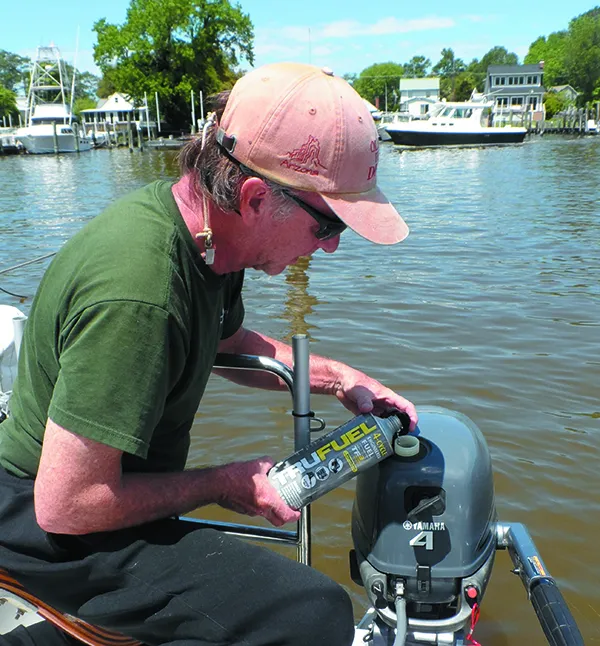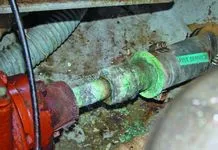Canned gasoline products like TruFuel formulated without ethanol and using more highly refined alkylate base stock offer the promise of improved storage stability. Could we replace our station-bought fuel before passage to keep our engine in “storage mode” but still ready to run if needed? Should we run it through our engine before storage to ensure corrosion doesn’t set in?
No ethanol in our fuel means no phase separation. Water is not likely to be absorbed from the air, in the tank or the carburetor, and that probably means less corrosion. These canned fuels claim to include the required storage and anticorrosion additives, but overall, TrueFuel is not that different from ethanol-free gasoline.
How We Tested
We’ve learned that if we can stop carburetor corrosion, we can stop most carburetor fouling. Thus, we ran both long term storage stability and corrosion tests. The storage stability test is the same one used in prior PS testing and is based on a modified ASTM D 4625 (see PS August 2012), but using different time periods and temperatures. The test period for aging was adjusted to be roughly equivalent to 6 months of off–season storage. The corrosion test period was equivalent to 2 years under the worst possible conditions.
Observations
In theory an alkylate fuel should be more stable and less prone to aging. However, when no metal samples were added, the TruFuel performed no better than good quality ethanol-free gasoline.
We then added metal coupons and a little moisture, and the story changed. Modern gasoline is quite stable unless there is corrosion to catalyze polymerization. Without ethanol, water is not bound in suspension, and there can be very little corrosion.
Corrosion. TruFuel did not dissolve any of the water/seawater blend, so unlike with ethanol fuels, there was very little corrosion. TruFuel is said to contain corrosion inhibitors, and based on our test results, this appears to be true.
Non-ethanol gas. We’ve tested this in the past, and the storage stability and corrosion resistance was pretty darn good, though not quite at the same level as TruFuel. Our metal-free test of E10 this time around, suggests this is probably still a very good option for storage.
Availability: In most metropolitan, suburban, and even fringe areas, ethanol gas is required as part of an air pollution reduction plan. Even rural areas are heavily pressured to sell ethanol in order to meet mandated blend targets. But if you Google “non-ethanol gasoline” in your state you might just find some in a not too distant rural area. Expect to pay 20-30 cents extra. If you are planning to store fuel for long periods, it is worth it for that last fill-up of the season.
Conclusions
Engineered fuels in a can are unaffordable for regular operation of outboard engines. But there is clear value in sucking some of this magic juice through the fuel train during winterization, so that what remains in the lines and carburetor is stable and corrosion free.
The fuel can also be added to other small engines—lawn mowers, snowblowers, etc. What about chainsaws and line trimmers that use a diaphragm carburetor (as opposed to float valves) so that they don’t spill when operated at odd angles? That changes things a bit. But it’s probably still a good idea.
Why not just use ethanol-free fuel? Honestly, we think ethanol-free fuel is the most cost-effective solution to engine protection. Without ethanol to draw and dissolve the water, corrosion is nil and aging is very slow. If you can find it, use it. We still suggest a PS-tested storage additive, such as Stabil 360 or Biobor EB.
If non-ethanol fuel is truly unavailable, even $26/gallon fuel in a can may be worth a try for winterization only.











